Organic Beddings Market Overview, 2031
The global organic beddings market was valued at $273.5 million in 2021, and is projected to reach $539 million by 2031, growing at a CAGR of 7.1% from 2022 to 2031. A rise in demand for organic bedding products is suggested by the fact that luxury bedding products, when combined with their practical advantages, are helping the business operate better. High-quality bedding is now more necessary than ever because of the important connection between sound sleep and a healthy body and mind. 50 to 70 million Americans, according to the American Sleep Apnea Association, have sleep-related problems, and the number of people who lack sleep has increased over the past 30 years. Additionally, the trend among rich consumers has been a growth in the demand for personalized beds. Currently, only a few high-end mattress brands offer fully customizable mattresses, but it is anticipated that additional brands will soon follow pace.
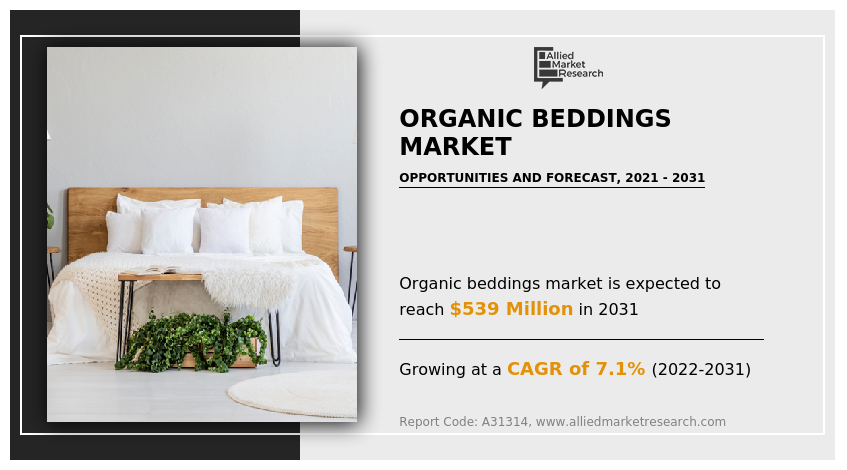
Due to the absence of chemical additions, organic bedding products are incredibly comfortable and beneficial. These products are made with cotton that is typically produced, is grown without the use of toxic pesticides, and has undergone environmentally safe dyeing, bleaching, and finishing processes. Due to the use of organic materials in its construction, the organic mattress also aids in the natural alignment of the spine when one is sleeping. These products are expected to help with North America's growing sleep difficulties because they promote restful sleep. As a result, customers spend a lot of money renovating and enhancing their houses, which is anticipated to fuel the Organic Beddings Market Size expansion.
A rise in demand for organic bedding products is suggested by the fact that luxury bedding products, when combined with their practical advantages, are helping the business operate better. High-quality bedding is now more necessary than ever because of the important connection between sound sleep and a healthy body and mind. 50 to 70 million Americans, according to the American Sleep Apnea Association, have sleep-related problems, and the number of people who lack sleep has increased over the past 30 years. Additionally, the trend among rich consumers has been a growth in the demand for personalized beds. Currently, only a few high-end mattress brands offer fully customizable mattresses, but it is anticipated that additional brands will soon follow pace.
The last few decades have seen an increase in consumer awareness of organic products. The majority of bedsheets, pillowcases, blankets, and other bedding products sold currently are manufactured from a variety of chemicals, some of which are exceedingly harmful to one's health, including formaldehyde, pesticides, petrochemicals, artificial colors, and others. In these circumstances, the new trend is to go organic and use natural, organic raw materials in order to lower the risk of disease, illness, and problems. These products should contain no pesticides, chemicals, or additives. Given that chemicals play a significant role in sleeping, many consumers are avoiding them in their bedding products. Due to this, there is a rising demand for organically produced raw materials and bedding, which will help aid increase Organic Beddings Market Demand.
Beddings are available for purchase from customers in a variety of retail settings, such as hypermarkets, specialty stores, brand stores, and more. However, the availability of organic bedding through these retail channels used to be extremely limited because consumers were unaware of or hesitant to buy such products. However, because of the rising demand for organic products, a wide range of retail outlets have begun stocking and offering a selection of organic bedding. A growing number of specialty retailers with a focus on organic bedding are also stocking organic bedding in addition to furniture and home accessory specialty stores. In order to sell their products directly to consumers, the majority of producers of organic bedding are opening their own online stores as well as distributing through e-commerce companies. By giving customers greater access to and the option to select from a wide choice of organic beddings, this rise in the stocking of organic beddings is assisting in the Organic Beddings Market Growth.
Producing organic materials like cotton, linen, and hemp is challenging because it necessitates a great deal of expertise to care for the plants correctly and to make sure their growing conditions are optimal. Additionally, the production of good organic wool is challenging because commodities like wool can only be certified as organic if they are derived from sheep that were grown naturally and organically. Numerous farmers around the world choose not to grow organic raw materials as a result of these factors. As a result, less organic raw material is produced, which in turn results in less organic fiber being created for use in bedding. The market for organic bedding is negatively impacted as a result of the lower volumes of organic raw materials being produced as well as the increased costs of those components.
Organic food and consumer products are becoming more and more popular all over the world. Organic farming produces products that are better for the environment and for consumers, who are becoming more and more aware of this. The condition of the soil is also improved by organic farming, which uses fewer herbicides, insecticides, and artificial fertilizers. Using organic farming methods also uses a very small quantity of water. These factors have led to the majority of governments in the world advocating organic farming and giving farmers the resources, they need to adopt it, including the resources, information, and infrastructure. As a result, organic cotton, hemp, linen, and other fibers are being grown more frequently. The number of organic fibers and materials available to produce organic bedding will grow along with the expansion of such raw material farming, fueling the growth of the organic bedding market in the future.
One of the main drivers of the global demand for organic bedding is the rise in consumer spending on home furnishings and the expansion of the real estate industry. Additionally, a number of companies are creating bedding for homes out of materials like lightweight, chemical-free, and anti-microbial cotton and silk to promote restful sleep. Additionally, through e-commerce outlets, they are introducing creative holiday pillow, duvet, and cushion sets. This is accelerating the market's expansion together with the simple accessibility of personalized mattresses and bedding at reasonable prices. The demand for home bedding created with organic vegetable dyes is also rising as a result of growing environmental concerns. Other factors promoting organic beddings market growth in the upcoming years include the rise of nuclear families, the expanding trend of minimalist bedrooms, and the rising popularity of adjustable beds, which is aiding in the positive growth of the organic beddings market forecast.
The organic beddings market is segmented into Type, Material, End User and Distribution Channel. By type, the market is divided into bedsheets, pillow covers, blankets, and others. By material, it is classified into cotton, linen, and others. By end user, the organic beddings market is divided into residential and commercial. By distribution channel, the market is divided into hypermarkets & supermarkets, specialty stores, and online channels. Region wise, the organic beddings market is analyzed across North America, Europe, Asia-Pacific, and LAMEA.
The bedsheets segment, as per product type, dominated the global organic beddings market in 2021 and is anticipated to maintain its dominance throughout the forecast period. The market for organic bedsheets is expanding tremendously due to the usage of organic raw materials in the production of the bedsheets and the resulting rise in customer base.
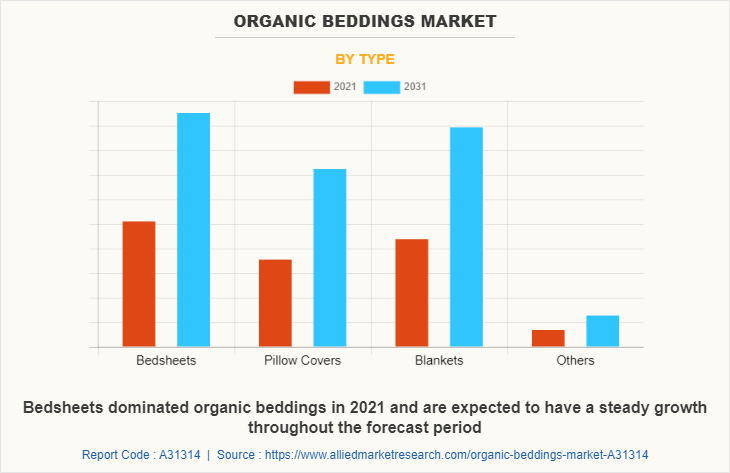
The cotton segment dominates the global organic beddings market. The comfort, affordability, and ease of use of cotton bedding are the three key elements influencing its increased popularity. The application of methods to make these beds hydrophobic and increase durability may enhance the market.
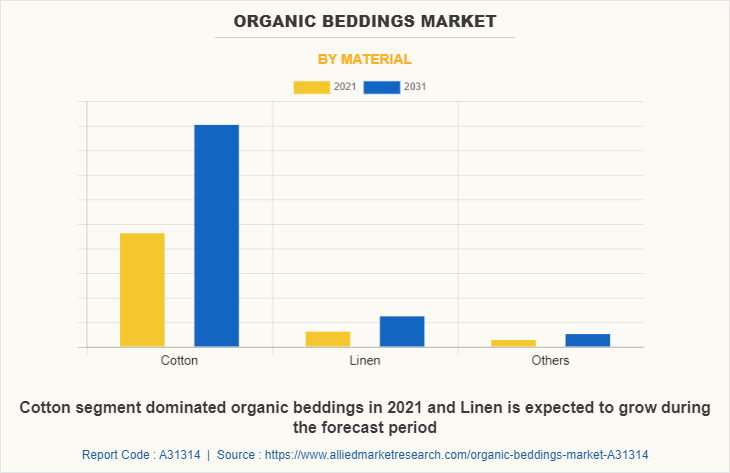
The commercial segment exhibits the fastest growth in the global organic beddings market. Although the use of organic bedding in the commercial sector is less common than in the residential sector, it is expanding rapidly as a result of the growing focus on customer satisfaction and experience.
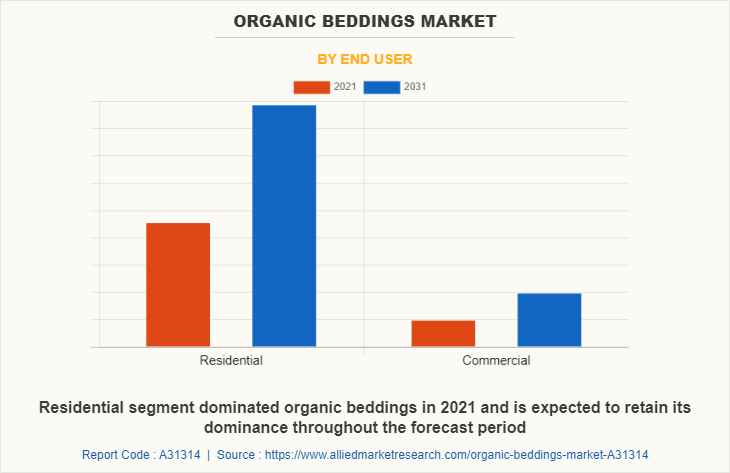
The specialty stores segment exhibits the fastest growth in the global organic beddings market. Specialty stores offer promotions with discounts and vouchers to entice clients and increase foot traffic. As a result, people will receive enticing offers to purchase organic bedding, which benefits the brand's reputation and profits.
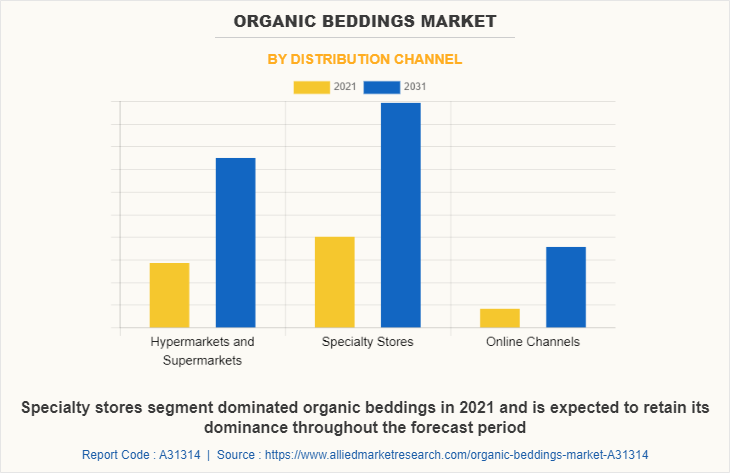
Region wise, North America dominated the market with the largest share during the forecast period. The region's organic bedding market is booming as a result of the rising consumer interest in such products and the region's expanding supply of organic bedding. Due to the rising demand for high-quality and lavish bedding products, Asia-Pacific has the organic bedding market's fastest rate of growth. Rapid globalization, westernization, modernization, and an increase in the number of commercial and residential properties are some of the key organic beddings market growth drivers for this region.
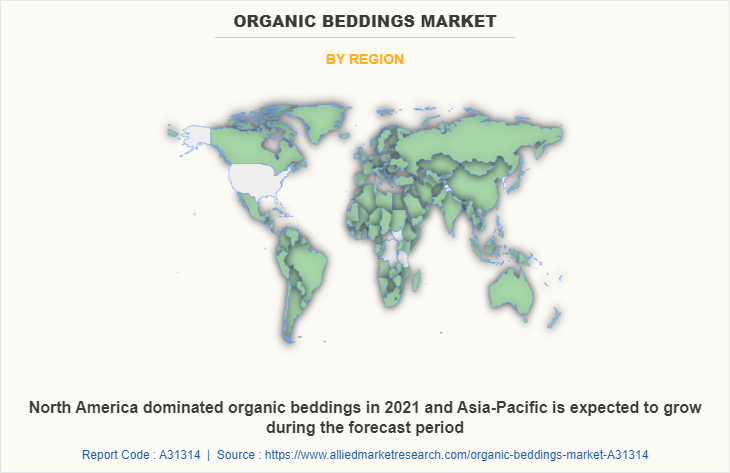
The major players analyzed for the organic beddings industry are AKP TEX, Alva Linen, Baea, Balavigna Mills Pvt. Ltd., Bhumi Organic Cotton, Cam Cam Copenhagen, Conscious Convert, COYUCHI, Falucca Linen Company, Good Night Naturals, Little Leaf Organics, Malaika Linens, Parachute Home, Serendipity Organics, Sojao, Sunday Bedding, The Pure Cotton Shop, Wear Pact, LLC, Williams-Sonoma, Inc., and 4Spaces GmbH. Key players operating in the organic beddings market have adopted product launch, business expansion, and mergers & acquisitions as key strategies to expand their organic beddings market share, increase profitability, and remain competitive in the organic beddings market.
Key Benefits For Stakeholders
- This report provides a quantitative analysis of the market segments, current trends, estimations, and dynamics of the organic beddings market analysis from 2021 to 2031 to identify the prevailing organic beddings market opportunities.
- The organic beddings market research is offered along with information related to key drivers, restraints, and opportunities.
- Porter's five forces analysis highlights the potency of buyers and suppliers to enable stakeholders make profit-oriented business decisions and strengthen their supplier-buyer network.
- In-depth analysis of the organic beddings market segmentation assists to determine the prevailing organic beddings market opportunities.
- Major countries in each region are mapped according to their revenue contribution to the global organic beddings market.
- Market player positioning facilitates benchmarking and provides a clear understanding of the present position of the organic beddings market players.
- The report includes the analysis of the regional as well as global organic beddings market trends, key players, market segments, application areas, and market growth strategies.
Organic Beddings Market Report Highlights
| Aspects | Details |
| Market Size By 2031 | USD 539 million |
| Growth Rate | CAGR of 7.1% |
| Forecast period | 2021 - 2031 |
| Report Pages | 245 |
| By Type |
|
| By Material |
|
| By End User |
|
| By Distribution Channel |
|
| By Region |
|
| Key Market Players | Parachute Home, The Pure Cotton Shop, Malaika Linens, 4Spaces GmbH, Conscious Convert, Good Night Naturals, Bhumi Organic Cotton, Little Leaf Organics, Serendipity Organics, Falucca Linen Company, Williams-Sonoma, Inc., Alva Linen, Baea, AKP TEX, Wear Pact, LLC, Cam Cam Copenhagen, Sunday Bedding, Balavigna Mills Pvt. Ltd., Sojao, COYUCHI |
Analyst Review
According to the insights of CXOs of leading companies, majority of customers are interested in bedding products that address common care problems with clothing, such as pilling, shrinking, and stain resistance, as well as products that provide standard active performance features like abrasion resistance, odor control, thermal regulation, and moisture management. If the cotton products provided improved durability or moisture management capabilities, people would choose them over bedding and sheets made of synthetic fibers. These aforementioned factors drive the growth of the global organic beddings market.
CXOs further added that customers believe cotton is best suited to satisfy their fundamental needs for comfort and quality, as well as their needs for dependability, sustainability, and an overall comfortable night's sleep. As a result, cotton is the fiber of choice for bedding product categories., Fabric design and distinctive dyeing and finishing methods can also help cotton sheets and bedding products compete favorably with synthetic fibers, beyond performance-enhancing technology. The majority of customers are drawn to cotton-based fabric concepts, designs and patterns that hide wrinkles. As a result, the market is expected to grow rapidly in the near future.
The global organic beddings market size was valued at $273,507.2 thousand in 2021 and is projected to reach $538,966.1 thousand by 2031, registering a CAGR of 7.1% from 2022 to 2031.
The global organic beddings market registered a CAGR of 7.1% from 2022 to 2031.
Raise the query and paste the link of the specific report and our sales executive will revert with the sample.
The forecast period in the organic beddings market report is from 2022 to 2031.
The top companies that hold the market share in the organic beddings market include Williams-Sonoma, Inc., Wear Pact, LLC, COYUCHI, and Little Leaf Organics.
The organic beddings market report has 4 segments. The segments are product type, material, end user, and distribution channel.
The emerging countries in the organic beddings market are likely to grow at a CAGR of more than 9.2% from 2022 to 2031.
Post COVID-19, the ease of lockdown had improved the supply chain for organic beddings products and the increasing demand for better sleep products will lead to the increase in demand for the organic beddings.
North America will dominate the organic beddings market by the end of 2031.
Loading Table Of Content...



